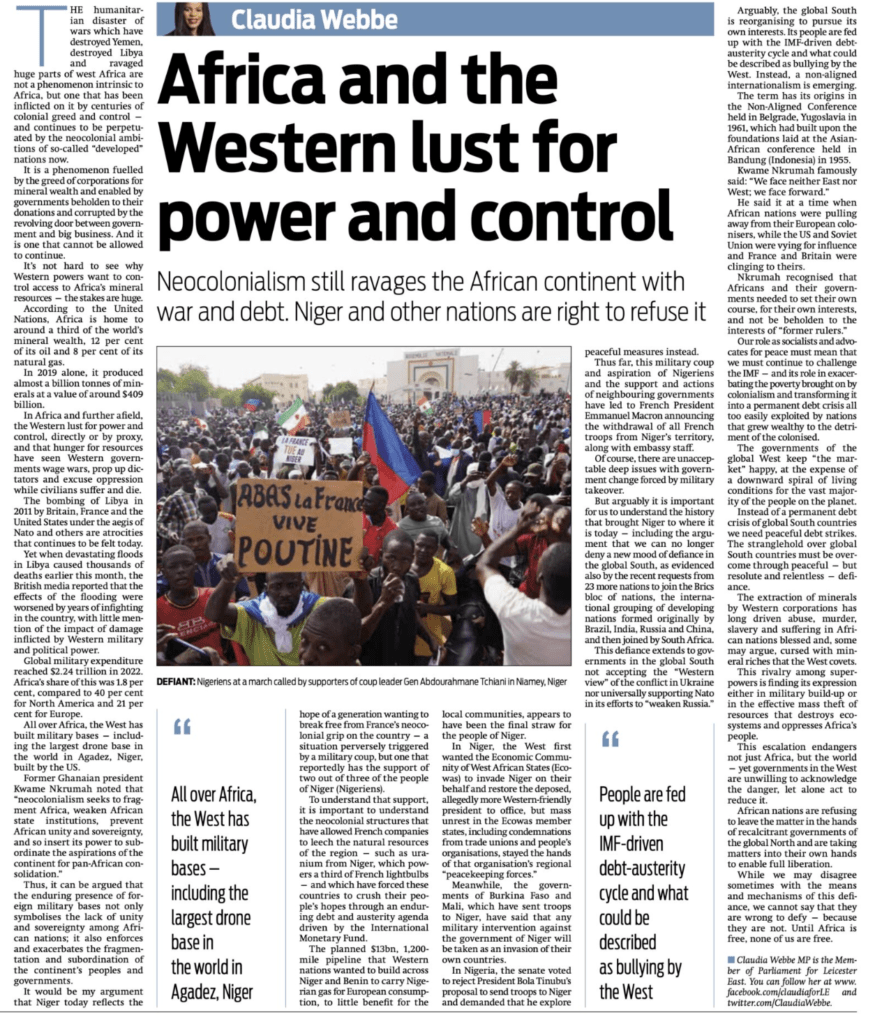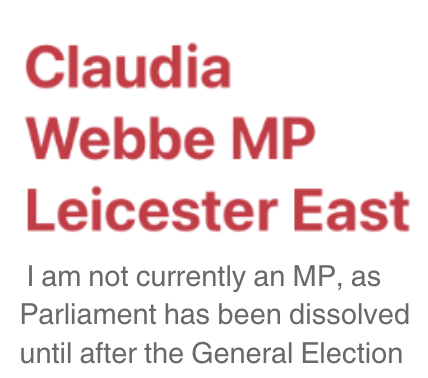
Africa and the Western lust for power and control
By Claudia Webbe MP
Neocolonialism still ravages the African continent with war and debt. Niger and other nations are right to refuse it, says CLAUDIA WEBBE MP
THE humanitarian disaster of wars which have destroyed Yemen, destroyed Libya and ravaged huge parts of west Africa are not a phenomenon intrinsic to Africa, but one that has been inflicted on it by centuries of colonial greed and control — and continues to be perpetuated by the neocolonial ambitions of so-called “developed” nations now.
It is a phenomenon fuelled by the greed of corporations for mineral wealth and enabled by governments beholden to their donations and corrupted by the revolving door between government and big business. And it is one that cannot be allowed to continue.
It’s not hard to see why Western powers want to control access to Africa’s mineral resources — the stakes are huge.
According to the United Nations, Africa is home to around a third of the world’s mineral wealth, 12 per cent of its oil and 8 per cent of its natural gas.
In 2019 alone, it produced almost a billion tonnes of minerals at a value of around $409 billion.
In Africa and further afield, the Western lust for power and control, directly or by proxy, and that hunger for resources have seen Western governments wage wars, prop up dictators and excuse oppression while civilians suffer and die.
The bombing of Libya in 2011 by Britain, France and the United States under the aegis of Nato and others are atrocities that continues to be felt today.
Yet when devastating floods in Libya caused thousands of deaths earlier this month, the British media reported that the effects of the flooding were worsened by years of infighting in the country, with little mention of the impact of damage inflicted by Western military and political power.
Global military expenditure reached $2.24 trillion in 2022. Africa’s share of this was 1.8 per cent, compared to 40 per cent for North America and 21 per cent for Europe.
All over Africa, the West has built military bases — including the largest drone base in the world in Agadez, Niger, built by the US.
Former Ghanaian president Kwame Nkrumah noted that “neocolonialism seeks to fragment Africa, weaken African state institutions, prevent African unity and sovereignty, and so insert its power to subordinate the aspirations of the continent for pan-African consolidation.”
Thus, it can be argued that the enduring presence of foreign military bases not only symbolises the lack of unity and sovereignty among African nations; it also enforces and exacerbates the fragmentation and subordination of the continent’s peoples and governments.
It would be my argument that Niger today reflects the hope of a generation wanting to break free from France’s neocolonial grip on the country — a situation perversely triggered by a military coup, but one that reportedly has the support of two out of three of the people of Niger (Nigeriens).
To understand that support, it is important to understand the neocolonial structures that have allowed French companies to leech the natural resources of the region — such as uranium from Niger, which powers a third of French lightbulbs — and which have forced these countries to crush their people’s hopes through an enduring debt and austerity agenda driven by the International Monetary Fund.
The planned $13bn, 1,200-mile pipeline that Western nations wanted to build across Niger and Benin to carry Nigerian gas for European consumption, to little benefit for the local communities, appears to have been the final straw for the people of Niger.
In Niger, the West first wanted the Economic Community of West African States (Ecowas) to invade Niger on their behalf and restore the deposed, allegedly more Western-friendly president to office, but mass unrest in the Ecowas member states, including condemnations from trade unions and people’s organisations, stayed the hands of that organisation’s regional “peacekeeping forces.”
Meanwhile, the governments of Burkina Faso and Mali, which have sent troops to Niger, have said that any military intervention against the government of Niger will be taken as an invasion of their own countries.
In Nigeria, the senate voted to reject President Bola Tinubu’s proposal to send troops to Niger and demanded that he explore peaceful measures instead.
Thus far, this military coup and aspiration of Nigeriens and the support and actions of neighbouring governments have led to French President Emmanuel Macron announcing the withdrawal of all French troops from Niger’s territory, along with embassy staff.
Of course, there are unacceptable deep issues with government change forced by military takeover.
But arguably it is important for us to understand the history that brought Niger to where it is today — including the argument that we can no longer deny a new mood of defiance in the global South, as evidenced also by the recent requests from 23 more nations to join the Brics bloc of nations, the international grouping of developing nations formed originally by Brazil, India, Russia and China, and then joined by South Africa.
This defiance extends to governments in the global South not accepting the “Western view” of the conflict in Ukraine nor universally supporting Nato in its efforts to “weaken Russia.”
Arguably, the global South is reorganising to pursue its own interests. Its people are fed up with the IMF-driven debt-austerity cycle and what could be described as bullying by the West. Instead, a non-aligned internationalism is emerging.
The term has its origins in the Non-Aligned Conference held in Belgrade, Yugoslavia in 1961, which had built upon the foundations laid at the Asian-African conference held in Bandung (Indonesia) in 1955.
Kwame Nkrumah famously said: “We face neither East nor West; we face forward.”
He said it at a time when African nations were pulling away from their European colonisers, while the US and Soviet Union were vying for influence and France and Britain were clinging to theirs.
Nkrumah recognised that Africans and their governments needed to set their own course, for their own interests, and not be beholden to the interests of “former rulers.”
Our role as socialists and advocates for peace must mean that we must continue to challenge the IMF — and its role in exacerbating the poverty brought on by colonialism and transforming it into a permanent debt crisis all too easily exploited by nations that grew wealthy to the detriment of the colonised.
The governments of the global West keep “the market” happy, at the expense of a downward spiral of living conditions for the vast majority of the people on the planet.
Instead of a permanent debt crisis of global South countries we need peaceful debt strikes. The stranglehold over global South countries must be overcome through peaceful — but resolute and relentless — defiance.
The extraction of minerals by Western corporations has long driven abuse, murder, slavery and suffering in African nations blessed and, some may argue, cursed with mineral riches that the West covets.
This rivalry among superpowers is finding its expression either in military build-up or in the effective mass theft of resources that destroys ecosystems and oppresses Africa’s people.
This escalation endangers not just Africa, but the world — yet governments in the West are unwilling to acknowledge the danger, let alone act to reduce it.
African nations are refusing to leave the matter in the hands of recalcitrant governments of the global North and are taking matters into their own hands to enable full liberation.
While we may disagree sometimes with the means and mechanisms of this defiance, we cannot say that they are wrong to defy — because they are not. Until Africa is free, none of us are free.
Claudia Webbe MP is the member of Parliament for Leicester East. You can follow her at www.facebook.com/claudiaforLE and twitter.com/ClaudiaWebbe


